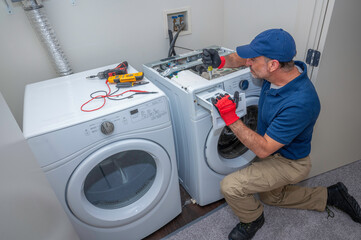
Household appliances play an essential role in daily life, making tasks faster, easier, and more efficient. From refrigerators that keep food fresh to washing machines that save time on laundry, these appliances are central to modern living. But when they break down, it can disrupt your routine and create unnecessary stress. This is where appliance repair becomes vital. Instead of rushing to replace costly equipment, professional repair services can restore function, extend the life of your appliances, and save money in the long run.
Why Appliance Repair is Important
Appliances are designed to make life convenient, but like any other machinery, they are subject to wear and tear. Motors burn out, seals wear down, and components may stop working after years of use. Ignoring small issues often leads to larger problems and higher expenses. Repairing appliances promptly ensures they operate safely, efficiently, and reliably.
Timely repairs also help conserve energy. A malfunctioning refrigerator or dryer, for example, may consume more electricity than necessary. By addressing issues quickly, you not only restore performance but also lower utility bills.
Common Appliances That Need Repair
Almost every home relies on a variety of appliances, each of which can require attention at some point.
- Refrigerators and Freezers
- These are among the most critical appliances in a household. Common issues include temperature fluctuations, faulty thermostats, or broken seals that prevent proper cooling. Repairing these issues quickly prevents food spoilage and waste.
- Washing Machines and Dryers
- Laundry appliances handle frequent use, leading to problems like leaks, drum malfunctions, or heating element failures. Professional repair ensures clothes are cleaned and dried efficiently without further damage.
- Ovens, Stoves, and Microwaves
- Cooking appliances are central to meal preparation. Burners that fail to heat, malfunctioning controls, or uneven cooking can disrupt routines. Appliance repair restores safety and functionality in the kitchen.
- Dishwashers
- Leaks, clogged drains, or faulty spray arms are common problems that reduce cleaning performance. Repair services extend the life of dishwashers while ensuring hygienic, spotless dishes.
- Small Appliances
- Even smaller units like coffee makers, blenders, and toasters may require occasional servicing. Though they may seem inexpensive to replace, repairs can often restore them to like-new condition.
Benefits of Professional Appliance Repair
Choosing professional appliance repair over DIY fixes or replacements comes with many advantages.
- Cost Savings: Repairing an appliance is typically far less expensive than purchasing a new one.
- Extended Lifespan: Routine maintenance and timely fixes can add years to the life of household machines.
- Safety: Professionals have the training to handle electrical and mechanical components safely, reducing risks of accidents.
- Convenience: Repair services save time and restore daily routines quickly.
- Environmental Responsibility: Repairing rather than replacing reduces electronic waste, making it a sustainable choice.
Signs That Your Appliance Needs Repair
Recognizing when an appliance is in trouble helps avoid sudden breakdowns. Common warning signs include:
- Strange noises or vibrations during operation.
- Higher than usual energy bills without increased usage.
- Leaks or visible wear and tear.
- Inconsistent performance or failure to complete cycles.
- Unresponsive controls or error messages.
Catching these signs early allows for simpler, more affordable repairs before problems escalate.
Preventive Maintenance for Appliances
While repairs are essential, prevention is just as important. Regular maintenance keeps appliances in top condition and reduces the chances of unexpected issues.
- Refrigerators: Clean condenser coils and check seals for leaks.
- Washing Machines: Inspect hoses for cracks and avoid overloading.
- Dryers: Clean lint traps and ducts to improve airflow.
- Ovens and Stoves: Check burners and keep surfaces free from spills.
- Dishwashers: Rinse filters and run cleaning cycles to prevent buildup.
These small steps help reduce wear and tear while improving efficiency.
DIY vs Professional Repair
Some homeowners may attempt to fix appliances themselves, but not all problems are suited for DIY solutions. While replacing a filter or unclogging a drain can be handled at home, electrical and mechanical issues should be left to experts. Attempting complex repairs without the right knowledge and tools can cause further damage or even pose safety risks. Professional appliance repair ensures accurate diagnosis and long-lasting solutions.
How Appliance Repair Boosts Home Value
Well-maintained appliances add value to your home. Whether you plan to stay long-term or eventually sell, functional appliances are a selling point for buyers. A home with properly working kitchen and laundry appliances demonstrates care and attention, which boosts overall property appeal. Investing in repair services not only benefits your daily comfort but also supports long-term home value.
Choosing Reliable Appliance Repair Services
When it comes to selecting a repair service, experience and reliability matter. Look for professionals with expertise in a wide range of appliances, transparent pricing, and a commitment to quality service. A reliable repair provider should be able to diagnose problems quickly, explain repair options clearly, and offer solutions that suit both your budget and needs.
Appliance repair plays a vital role in maintaining the comfort, efficiency, and functionality of any home. From refrigerators to washing machines, every appliance requires care and occasional servicing to continue operating at its best. By choosing professional repair services, homeowners save money, extend appliance lifespans, and avoid unnecessary stress.
Instead of replacing valuable machines at the first sign of trouble, consider the benefits of repair and preventive maintenance. Not only will you keep your household running smoothly, but you’ll also contribute to a more sustainable lifestyle by reducing waste. With timely attention and expert care, your appliances can continue to serve you well for many years to come.
